部编版小学三年级英语下册知识点期末知识汇总
人教部编版三年级下册英语各单元知识小结期末复习资料重点版

人教部编版三年级下册英语各单元知识小结期末复习资料重点版第一单元:Hello, Friends!本单元主要介绍日常问候用语和自我介绍的表达方式。
重点内容:- 日常问候用语:例如"Hello!"、"Hi!"、"Good morning!"- 介绍自己的名字和年龄:例如"My name is John. I'm 8 years old."- 问候他人并询问他人的名字和年龄:例如"What's your name?"、"How old are you?"第二单元:Let's Count!本单元主要研究数字的表达以及简单的数数。
重点内容:- 数字1到20的读法和书写:例如"one"、"two"、"three"等- 数字的顺序和数量的概念:例如"first"、"second"、"third"等- 数数的方法:例如"Count from 1 to 10!"、"Count by twos!"第三单元:My Body本单元介绍身体各部位的名称以及与身体相关的简单动作。
重点内容:- 身体各部位的名称:例如"head"、"shoulders"、"knees"、"toes"等- 描述身体动作:例如"touch your nose"、"clap your hands"等- 介绍个人外貌特征:例如"I have black hair."、"She has blue eyes."第四单元:My Family本单元主要研究家庭成员的称呼以及简单的家人介绍。
小学三年级英语下册知识点归纳
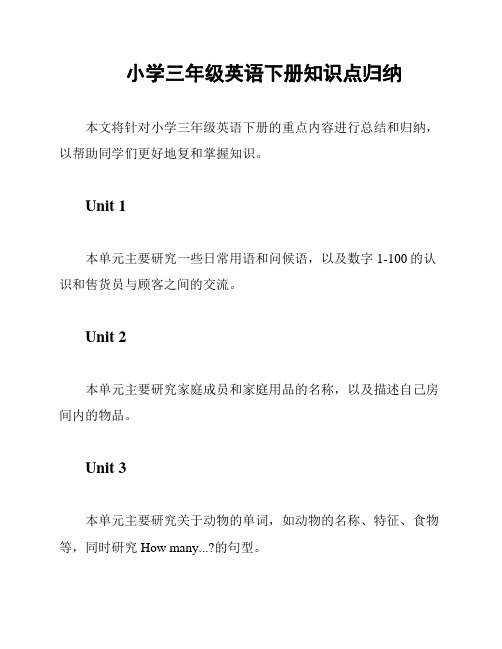
小学三年级英语下册知识点归纳
本文将针对小学三年级英语下册的重点内容进行总结和归纳,以帮助同学们更好地复和掌握知识。
Unit 1
本单元主要研究一些日常用语和问候语,以及数字1-100的认识和售货员与顾客之间的交流。
Unit 2
本单元主要研究家庭成员和家庭用品的名称,以及描述自己房间内的物品。
Unit 3
本单元主要研究关于动物的单词,如动物的名称、特征、食物等,同时研究How many...?的句型。
Unit 4
本单元主要研究季节和天气的相关词汇,以及How's the weather today?的句型。
Unit 5
本单元主要研究食物的种类和名称,以及Would you like some...?的表达方式。
Unit 6
本单元主要研究身体部位的名称和形容词,如头发、眼睛、耳朵等,同时研究What's the matter?的用法。
Unit 7
本单元主要研究关于交通工具的词汇和路线的表述,以及How do you go to school?的句型。
Unit 8
本单元主要研究日常活动的词汇,如洗澡、穿衣等,以及What are you doing?的用法。
总结
以上就是小学三年级英语下册的重点内容总结和归纳。
希望同学们可以在复习中加深记忆,提高英语水平。
部编版小学三年级下册英语知识点归纳总结
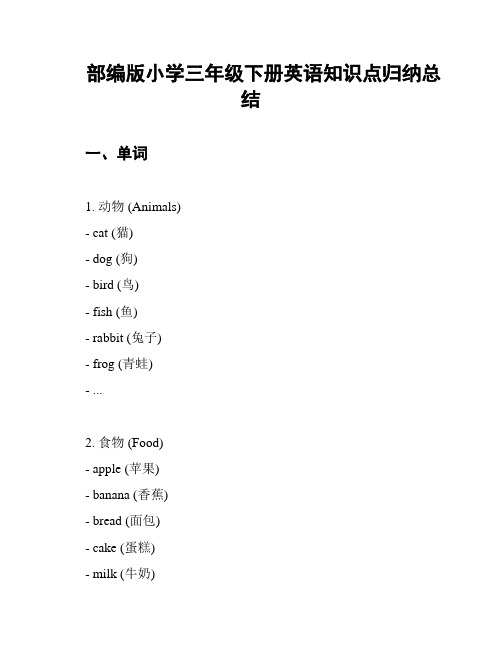
部编版小学三年级下册英语知识点归纳总结一、单词1. 动物 (Animals)- cat (猫)- dog (狗)- bird (鸟)- fish (鱼)- rabbit (兔子)- frog (青蛙)- ...2. 食物 (Food)- apple (苹果)- banana (香蕉)- bread (面包)- cake (蛋糕)- milk (牛奶)- rice (米饭)- ...3. 数字 (Numbers)- one (一)- two (二)- three (三)- four (四)- five (五)- six (六)- ...二、句型1. 问候 (Greetings)- Hello! (你好!)- Good morning! (早上好!) - How are you? (你好吗?) - ...2. 自我介绍 (Self-Introduction)- My name is... (我叫...)- I am... years old. (我...岁)- I like... (我喜欢...)- ...3. 打招呼 (Asking and Responding) - What's this? (这是什么?)- It's a... (这是一/个...)- How many...? (多少个...)- ...三、语法1. 介词 (Prepositions)- in (在...内)- on (在...上)- under (在...下)- near (靠近)- between (在...之间)- ...2. 形容词 (Adjectives) - big (大)- small (小)- tall (高)- short (矮)- happy (快乐)- sad (伤心)- ...3. 动词 (Verbs)- eat (吃)- drink (喝)- run (跑)- jump (跳)- sleep (睡觉)- study (研究)- ...四、练1. 翻译句子 (Translate the Sentences)- I have a pet dog. (我有一只宠物狗。
【部编版】三年级英语下册期末复习(必背必会知识点)

【部编版】三年级英语下册期末复习(必背必会知识点)1. 单词- 天气:sunny, windy, cloudy, rainy, snowy- 季节:spring, summer, autumn, winter- 食物:apple, banana, orange, bread, milk- 动物:cat, dog, bird, fish, rabbit2. 句子- What's the weather like today? 今天的天气怎么样?- It's sunny/windy/cloudy/rainy/snowy. 天气晴朗/有风/多云/下雨/下雪。
- Which season do you like best? 你最喜欢哪个季节?- I like spring/summer/autumn/winter best. 我最喜欢春天/夏天/秋天/冬天。
- I'd like an apple/banana/orange/bread/milk, please. 请给我一个苹果/香蕉/橙子/面包/牛奶。
- What animals do you like? 你喜欢什么动物?- I like cats/dogs/birds/fish/rabbits. 我喜欢猫/狗/鸟/鱼/兔子。
3. 语法- be动词的用法:am, is, are- am用于第一人称单数:I am happy. 我很快乐。
- is用于第三人称单数:He is tall. 他很高。
- are用于第一人称复数和第三人称复数:We are students. 我们是学生。
4. 对话- A: What's the weather like today? B: It's sunny.- A: 今天的天气怎么样? B: 天气晴朗。
- A: Which season do you like best? B: I like summer best.- A: 你最喜欢哪个季节? B: 我最喜欢夏天。
三年级下学期英语知识点总结

一、词汇1. 食物:apple, banana, orange, watermelon, hamburger, cake, ice cream, juice等。
2. 动物:cat, dog, bird, rabbit, tiger, lion, elephant, giraffe等。
3. 颜色:red, blue, green, yellow, orange, purple, black, white等。
4. 学科:math, English, science, music, PE, art等。
5. 家庭成员:dad, mom, brother, sister, grandmother, grandfather等。
6. 学校:classroom, desk, chair, teacher, student等。
二、语法1.句子结构:主语+谓语+宾语。
2. 疑问句:使用助动词do或does来提问,例如:Do you like apples? Does he have a pet?3. 否定句:在句子前面加上not,例如:I do not like bananas. He does not have a pet.三、日常用语1. 问候语:Hello, Hi, Good morning, Good afternoon, Good evening等。
2. 自我介绍:My name is…, I am…等。
3. 问答句:What is your name? How old are you? Do you like…?等。
四、句型1. I like/don't like….例如:I like apples. / I don't like pizza.2. Does he/she like…?例如:Does he like dogs? / Does she like drawing?3. What color is it?例如:What color is the apple? / What color is the car?五、日常生活1. 问路和指路:How do I get to...? Go straight. Turnleft/right. It's on the left/right.2. 购物:How much is it? It's… yuan.4. 日期:Wh at day is it today? Today is….5. 天气:What is the weather like today? It'ssunny/rainy/cloudy/windy.六、习惯和爱好1. 爱好:I like…, I don't like…, He/she likes…, He/she doesn't like….2. 日常活动:I get up, I eat breakfast/lunch/dinner, I go to school, I go home, I go to bed.七、数字和计数1.数字1-100的认读和拼写。
部编版三年级英语下册期末复习知识点总结
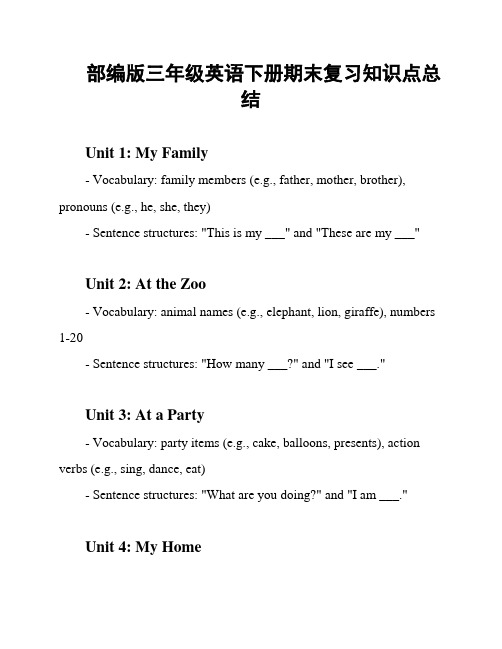
部编版三年级英语下册期末复习知识点总结Unit 1: My Family- Vocabulary: family members (e.g., father, mother, brother), pronouns (e.g., he, she, they)- Sentence structures: "This is my ___" and "These are my ___"Unit 2: At the Zoo- Vocabulary: animal names (e.g., elephant, lion, giraffe), numbers 1-20- Sentence structures: "How many ___?" and "I see ___."Unit 3: At a Party- Vocabulary: party items (e.g., cake, balloons, presents), action verbs (e.g., sing, dance, eat)- Sentence structures: "What are you doing?" and "I am ___."Unit 4: My Home- Vocabulary: rooms in the house (e.g., bedroom, kitchen, living room), furniture (e.g., bed, table, sofa)- Sentence structures: "Where is the ___?" and "It is in/on ___."Unit 5: At the Park- Vocabulary: outdoor activities (e.g., swing, slide, picnic), seasons and weather (e.g., spring, summer, sunny, rainy)- Sentence structures: "What do you want to do?" and "I want to___."Unit 6: On the Farm- Vocabulary: farm animals (e.g., cow, pig, sheep), colors- Sentence structures: "What color is the ___?" and "The ___ is___."Unit 7: My Daily Routine- Vocabulary: daily activities (e.g., wake up, brush teeth, have breakfast), adverbs of time (e.g., morning, afternoon, evening) - Sentence structures: "What time do you ___?" and "I ___ at ___."Unit 8: At the Supermarket- Vocabulary: food items (e.g., bread, milk, fruit), quantities (e.g., a loaf of bread, a glass of milk)- Sentence structures: "How much is the ___?" and "It is ___ yuan."Unit 9: My School- Vocabulary: school facilities (e.g., classroom, library, playground), school subjects (e.g., math, Chinese, English)- Sentence structures: "What do you have on ___?" and "I have___."Unit 10: At the Hospital- Vocabulary: body parts (e.g., head, eyes, stomach), health-related words (e.g., sick, tired, medicine)- Sentence structures: "What's the matter?" and "I have a ___."以上是部编版三年级英语下册的期末复习知识点总结。
部编版小学英语三年级下册知识点归纳
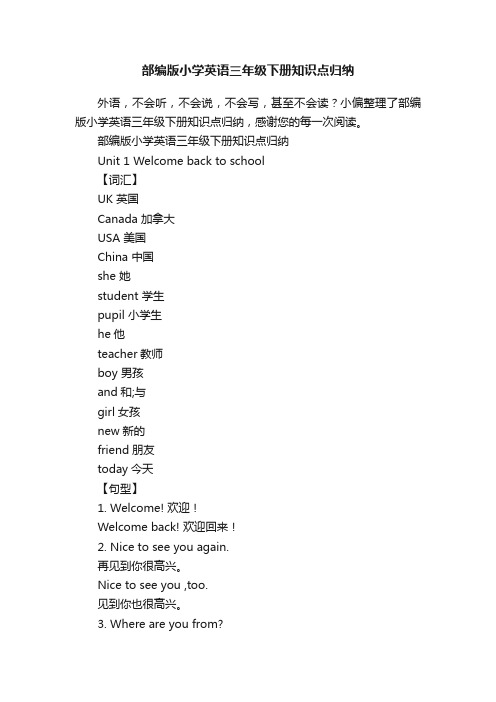
部编版小学英语三年级下册知识点归纳外语,不会听,不会说,不会写,甚至不会读?小偏整理了部编版小学英语三年级下册知识点归纳,感谢您的每一次阅读。
部编版小学英语三年级下册知识点归纳Unit 1 Welcome back to school【词汇】UK 英国Canada 加拿大USA 美国China 中国she 她student 学生pupil 小学生he他teacher教师boy 男孩and和;与girl女孩new新的friend朋友today今天【句型】1. Welcome! 欢迎!Welcome back! 欢迎回来!2. Nice to see you again.再见到你很高兴。
Nice to see you ,too.见到你也很高兴。
3. Where are you from?你来自哪里?I’m from the UK/USA.我来自英国/美国。
I’m from China/Canada.我来自中国/加拿大4. We have two new friends today.今天我们有两位新朋友。
5. This is Amy.She is a student.这是埃米,她是个学生。
6. This is Mr. Jones. He is a teacher.这是琼斯先生,他是一位教师。
Unit 2 My family【词汇】father父亲;爸爸dad (口语) 爸爸;爹爹man男人woman 女人mother母亲;妈妈sister 姐;妹brother 兄;弟grandmother(外)祖母grandma (口语)(外)祖母grandfather(外)祖父grandpa(口语)(外)祖父family家;家庭【句型】1. Who’s that man? He is my father.那个男人是谁?他是我爸爸。
2. Who’s that woman? She is my mother.那个女人是谁?她是我妈妈。
英语三年级下册重点知识归纳

英语三年级下册重点知识归纳一、词汇1. 名词:(1)动物:狗(dog)、猫(cat)、鸟(bird)、牛(cow)、羊(sheep)、猪(pig)等。
(2)颜色:红色(red)、绿色(green)、蓝色(blue)、黄色(yellow)等。
(3)水果:苹果(apple)、香蕉(banana)、橘子(orange)等。
(4)食物:面包(bread)、汉堡包(hamburger)、炸薯条(fries)等。
(5)家庭成员:爸爸(dad)、妈妈(mom)、我(I)、爷爷奶奶(grandpa/grandma)等。
2. 动词:(1)喜欢做某事:like to do sth.例句:Do you like to play football? 不,我不喜欢踢足球。
(2)去某地:go to +地点例句:Let's go to the park. 让我们去公园吧。
二、语法1. 现在进行时:表示正在发生的事情或正在进行的动作。
构成:be + doing 表示法:主语 + be + doing 例句:(1)They are playing basketball now. (2)I am studying English now.注意点:(1)be动词的变化(am/is/are)(2)与一般现在时的区别2. 一般现在时:表示经常性、习惯性动作或存在的状态,也表示永恒不变的真理。
构成:(1)主语+动词(+其他)(2)主语+be (am/is/are)+其他例句:(1)He always helps me when I am in trouble. (2)The sun rises in the east every morning.注意点:(1)谓语动词是否为一般现在时。
(2)谓语动词的单复数形式。
(3)与一般将来时的区别。
三、对话与阅读理解这部分要求学生掌握一定的词汇量和语法知识,才能正确理解文章的意思。
同时,对话的练习可以帮助学生提高口语表达能力,增强与他人的沟通能力。
英语三年级下册知识点归纳
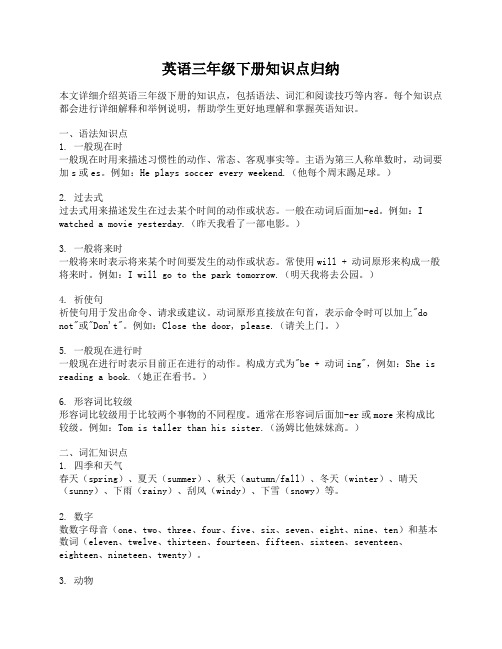
英语三年级下册知识点归纳本文详细介绍英语三年级下册的知识点,包括语法、词汇和阅读技巧等内容。
每个知识点都会进行详细解释和举例说明,帮助学生更好地理解和掌握英语知识。
一、语法知识点1. 一般现在时一般现在时用来描述习惯性的动作、常态、客观事实等。
主语为第三人称单数时,动词要加s或es。
例如:He plays soccer every weekend.(他每个周末踢足球。
)2. 过去式过去式用来描述发生在过去某个时间的动作或状态。
一般在动词后面加-ed。
例如:I watched a movie yesterday.(昨天我看了一部电影。
)3. 一般将来时一般将来时表示将来某个时间要发生的动作或状态。
常使用will + 动词原形来构成一般将来时。
例如:I will go to the park tomorrow.(明天我将去公园。
)4. 祈使句祈使句用于发出命令、请求或建议。
动词原形直接放在句首,表示命令时可以加上"do not"或"Don't"。
例如:Close the door, please.(请关上门。
)5. 一般现在进行时一般现在进行时表示目前正在进行的动作。
构成方式为"be + 动词ing",例如:She is reading a book.(她正在看书。
)6. 形容词比较级形容词比较级用于比较两个事物的不同程度。
通常在形容词后面加-er或more来构成比较级。
例如:Tom is taller than his sister.(汤姆比他妹妹高。
)二、词汇知识点1. 四季和天气春天(spring)、夏天(summer)、秋天(autumn/fall)、冬天(winter)、晴天(sunny)、下雨(rainy)、刮风(windy)、下雪(snowy)等。
2. 数字数数字母音(one、two、three、four、five、six、seven、eight、nine、ten)和基本数词(eleven、twelve、thirteen、fourteen、fifteen、sixteen、seventeen、eighteen、nineteen、twenty)。
小学三年级英语下册知识点归纳总结
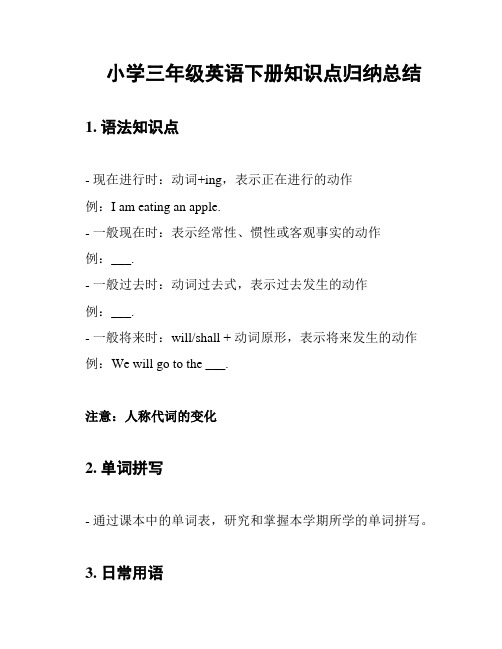
小学三年级英语下册知识点归纳总结1. 语法知识点
- 现在进行时:动词+ing,表示正在进行的动作
例:I am eating an apple.
- 一般现在时:表示经常性、惯性或客观事实的动作
例:___.
- 一般过去时:动词过去式,表示过去发生的动作
例:___.
- 一般将来时:will/shall + 动词原形,表示将来发生的动作例:We will go to the ___.
注意:人称代词的变化
2. 单词拼写
- 通过课本中的单词表,研究和掌握本学期所学的单词拼写。
3. 日常用语
- 学会日常生活中常用的简单英语句子,如问候、道别、询问等。
例:Hello, how are you? / Goodbye, see you later.
4. 对话与表达
- 研究掌握一些常见的对话和表达方式,如提出问题、回答问
题等。
例:
- Can you help me?
- Yes, I can help you.
- What's your favorite color?
- ___ blue.
5. 阅读理解
- 研究阅读理解的基本技巧,如理解文章大意、找出关键词等。
6. 句子构成
- 研究句子的基本构成和语序,如主语+谓语+宾语等。
例:I like ice cream.
7. 口语练
- 多进行口语练,提高口语表达能力。
可以通过模仿对话、角色扮演等方式进行练。
以上是小学三年级英语下册的知识点归纳总结,希望对你的学习有帮助!。
部编版三年级英语下册总复习要点汇总【最新】
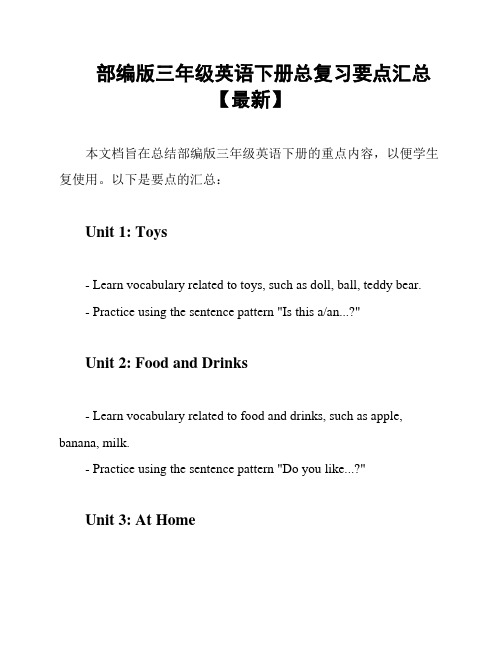
部编版三年级英语下册总复习要点汇总【最新】本文档旨在总结部编版三年级英语下册的重点内容,以便学生复使用。
以下是要点的汇总:Unit 1: Toys- Learn vocabulary related to toys, such as doll, ball, teddy bear.- Practice using the sentence pattern "Is this a/an...?"Unit 2: Food and Drinks- Learn vocabulary related to food and drinks, such as apple, banana, milk.- Practice using the sentence pattern "Do you like...?"Unit 3: At Home- Learn vocabulary related to rooms in a house, such as bedroom, kitchen, bathroom.- Practice using the sentence pattern "Where is/are...?"Unit 4: At School- Learn vocabulary related to school objects, such as book, pen, desk.- Practice using the sentence pattern "What's this/that?"Unit 5: Numbers 1-100- Learn numbers from 1 to 100.- Practice counting and asking "How many...?"Unit 6: Actions- Learn vocabulary related to actions, such as run, jump, swim.- Practice using the sentence pattern "Can you...?"Unit 7: Time- Learn vocabulary related to time, such as morning, afternoon, night.- Practice using the sentence pattern "What time is it?"Unit 8: Weather- Learn vocabulary related to weather, such as sunny, rainy, windy.- Practice using the sentence pattern "How's the weather?"以上是部编版三年级英语下册的总复习要点汇总,学生可以根据这些要点进行有针对性的复习。
小学三年级英语下册复习教学知识点归纳总结
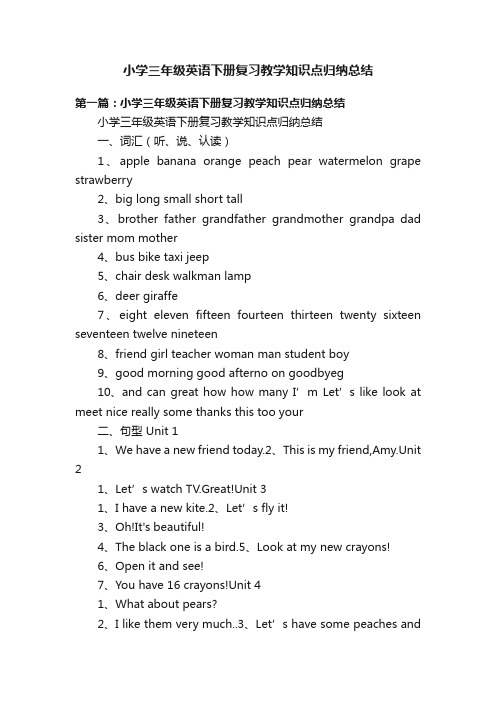
小学三年级英语下册复习教学知识点归纳总结第一篇:小学三年级英语下册复习教学知识点归纳总结小学三年级英语下册复习教学知识点归纳总结一、词汇(听、说、认读)1、apple banana orange peach pear watermelon grape strawberry2、big long small short tall3、brother father grandfather grandmother grandpa dad sister mom mother4、bus bike taxi jeep5、chair desk walkman lamp6、deer giraffe7、eight eleven fifteen fourteen thirteen twenty sixteen seventeen twelve nineteen8、friend girl teacher woman man student boy9、good morning good afterno on goodbyeg10、and can great how how many I’m Let’s like look at meet nice really some thanks this too your二、句型 Unit 11、We have a new friend today.2、This is my friend,Amy.Unit 21、Let’s watch TV.Great!Unit 31、I have a new kite.2、Let’s fly it!3、Oh!It's beautiful!4、The black one is a bird.5、Look at my new crayons!6、Open it and see!7、You have 16 crayons!Unit 41、What about pears?2、I like them very much..3、Let’s have some peaches andpears.4、Have some fruits.5、I don’t like bananas.Unit 51、Where is my car?2、On your desk?3、It’s under the chair.4、Excuse me, Amy.5、Here you are!Thank you.Unit 61、Look at the elephant!Wow!It’s so big!2、It has a long nose and a short tail.3、Oh,it’s so funny!/It’s so tall.4、You see.The giraffe is tall.The deer is short.5、Dad ,you’re tall.I’m short.6、You’re right.三、对话:1、Who’s that woman? She is my mother.Who’s that man? He is my father.Who’s that boy?/Look out!2、Where are you from? I’m from America.3、How many kites can you see?/How many crayons do you have?4、Do you like peaches? Yes ,I do./No, I don’t.5、Can I have an apple ,please? Certainly!6、Have some more ? No, thank you.7、Can I use your pencil? No problem.四、口语:1、Good morning,boys and gils!/Good afternoon!/Goodbye./Nice to meet you.2、Watch out!/Come in./I’m sorry.It’s OK./Come on./Wow,how funny./What a big fish!/It tastes good./Really?小学英语三年级下册复习要点分析及方法对于三年级的老师和学生来说,大约还有10课时的复习时间,面对时间紧、任务多、孩子小的这一情况,我们不得不充分利用好课堂上的有限时间。
部编人教版三年级英语下册知识点复习提纲
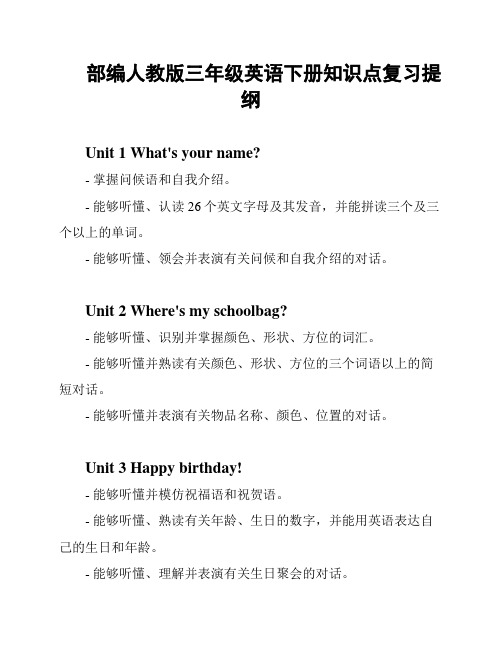
部编人教版三年级英语下册知识点复习提纲Unit 1 What's your name?- 掌握问候语和自我介绍。
- 能够听懂、认读26个英文字母及其发音,并能拼读三个及三个以上的单词。
- 能够听懂、领会并表演有关问候和自我介绍的对话。
Unit 2 Where's my schoolbag?- 能够听懂、识别并掌握颜色、形状、方位的词汇。
- 能够听懂并熟读有关颜色、形状、方位的三个词语以上的简短对话。
- 能够听懂并表演有关物品名称、颜色、位置的对话。
Unit 3 Happy birthday!- 能够听懂并模仿祝福语和祝贺语。
- 能够听懂、熟读有关年龄、生日的数字,并能用英语表达自己的生日和年龄。
- 能够听懂、理解并表演有关生日聚会的对话。
Unit 4 I love my family- 能够听懂、认读有关家庭成员、颜色、服饰的生词。
- 能够听取、理解生活中关于家庭成员的句子,并能进行初步的语用分析。
- 能够初步使用I love my ... I have a...等句型表述自己的家庭。
Unit 5 At the zoo- 能够听懂、认读动物、颜色、形状等生词。
- 能够听懂、理解并表达有关动物、声音等简单信息。
- 能够听懂并表演与动物、位置等有关的简短对话。
Unit 6 What are you doing?- 能够听懂、理解并使用句型"What are you doing?" "I'm watching TV."等基本句型。
- 能够听懂、熟读有关时间的词汇和句型,并能表达自己在某个具体时间正在做什么事情。
- 能够听懂、理解并表演有关日常生活的简短对话。
Unit 7 Where is it?- 能够听懂、认读有关地点、方位等生词。
- 能够听懂、理解并使用基本问路和指路的句型,并能进行初步的语用分析。
- 能够初步使用There is/are...句型描述地点,表述简单的方位关系。
部编人教版三年级英语下册各单元知识点归纳(全册)
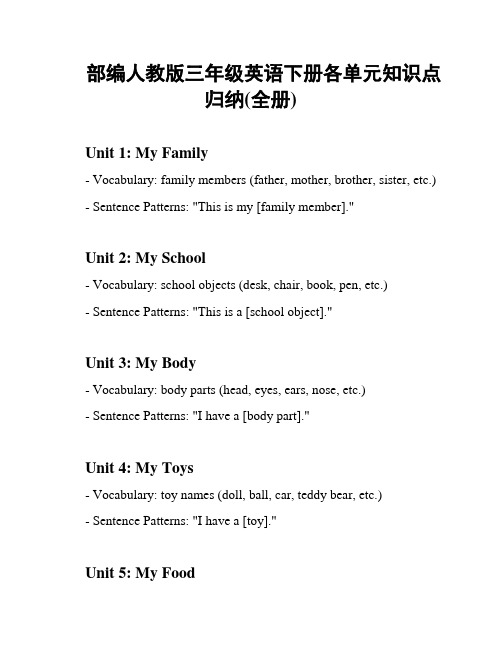
部编人教版三年级英语下册各单元知识点归纳(全册)Unit 1: My Family- Vocabulary: family members (father, mother, brother, sister, etc.) - Sentence Patterns: "This is my [family member]."Unit 2: My School- Vocabulary: school objects (desk, chair, book, pen, etc.)- Sentence Patterns: "This is a [school object]."Unit 3: My Body- Vocabulary: body parts (head, eyes, ears, nose, etc.)- Sentence Patterns: "I have a [body part]."Unit 4: My Toys- Vocabulary: toy names (doll, ball, car, teddy bear, etc.)- Sentence Patterns: "I have a [toy]."Unit 5: My Food- Vocabulary: food items (apple, bread, noodles, rice, etc.)- Sentence Patterns: "I like [food item]."Unit 6: My Clothes- Vocabulary: clothing items (hat, shirt, pants, shoes, etc.)- Sentence Patterns: "I'm wearing a [clothing item]."Unit 7: My Home- Vocabulary: rooms in a house (bedroom, kitchen, bathroom, living room, etc.)- Sentence Patterns: "This is the [room name]."Unit 8: My Daily Routine- Vocabulary: daily routine activities (wake up, brush my teeth, have breakfast, go to school, etc.)- Sentence Patterns: "In the morning, I [activity]."Unit 9: My Pets- Vocabulary: pet names (dog, cat, fish, bird, etc.)- Sentence Patterns: "I have a [pet]."Unit 10: My Hobbies- Vocabulary: hobby names (drawing, singing, dancing, swimming, etc.)- Sentence Patterns: "I like [hobby]."这份文档总结了部编人教版三年级英语下册的各个单元知识点。
部编版小学三年级英语下册知识点期末知识汇总
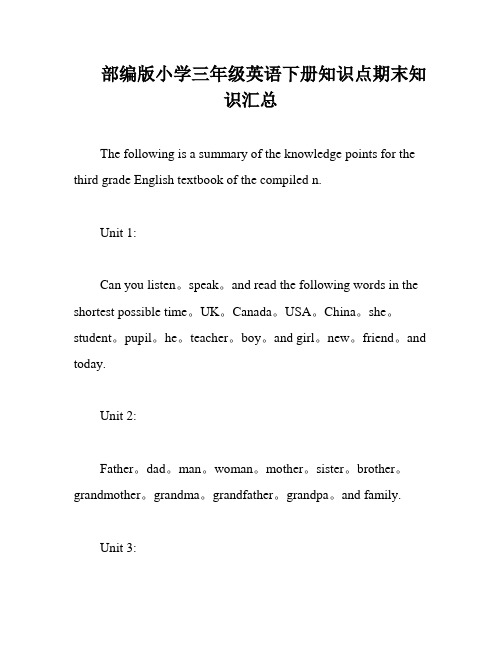
部编版小学三年级英语下册知识点期末知识汇总The following is a summary of the knowledge points for the third grade English textbook of the compiled n.Unit 1:Can you listen。
speak。
and read the following words in the shortest possible time。
UK。
Canada。
USA。
China。
she。
student。
pupil。
he。
teacher。
boy。
and girl。
new。
friend。
and today.Unit 2:Father。
dad。
man。
woman。
mother。
sister。
brother。
grandmother。
grandma。
grandfather。
grandpa。
and family.Unit 3:Thin。
fat。
tall。
short。
long。
small。
big。
giraffe。
so。
children。
and tail.Unit 4:On。
in。
under。
chair。
desk。
cap。
ball。
car。
boat。
map。
toy。
and box.Unit 5:Pear。
apple。
orange。
banana。
watermelon。
strawberry。
grape。
buy。
and fruit.Unit 6:XXX。
XXX。
XXX。
fourteen。
fifteen。
XXX。
XXX。
XXX。
XXX。
XXX。
kite。
and beautiful.XXX skills:1.When ing someone。
say "e!"2.To ask for a friend's name。
say "This is Amy."3.To ask where someone is from。
2023年部编版三年级下册英语单元基础知识归纳总结
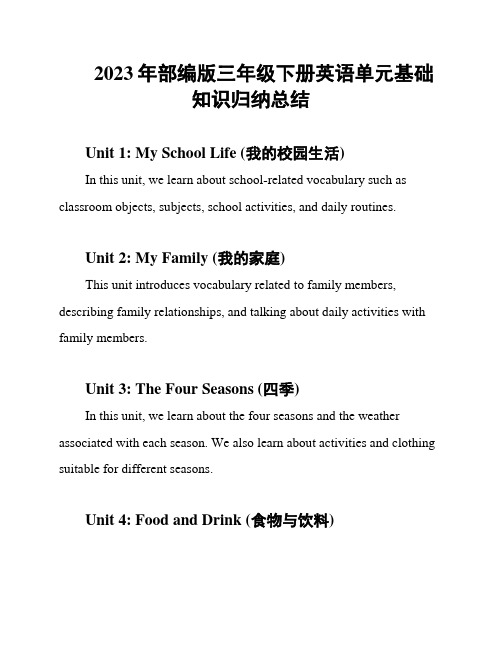
2023年部编版三年级下册英语单元基础知识归纳总结Unit 1: My School Life (我的校园生活)In this unit, we learn about school-related vocabulary such as classroom objects, subjects, school activities, and daily routines.Unit 2: My Family (我的家庭)This unit introduces vocabulary related to family members, describing family relationships, and talking about daily activities with family members.Unit 3: The Four Seasons (四季)In this unit, we learn about the four seasons and the weather associated with each season. We also learn about activities and clothing suitable for different seasons.Unit 4: Food and Drink (食物与饮料)This unit focuses on vocabulary related to various food and drinks. We learn about different types of food, healthy eating habits, and how to order food at a restaurant.Unit 6: Sports and Hobbies (体育和爱好)This unit introduces vocabulary related to different sports and hobbies. We learn how to talk about our favorite sports, activities we like to do, and how to express our preferences.Unit 7: Celebrations (庆祝活动)In this unit, we learn about various celebrations such as birthdays, New Year, and Chinese festivals. We learn about traditions, customs, and how to express good wishes.Unit 8: Animals and Nature (动物与自然)This unit focuses on vocabulary related to different animals and nature. We learn about animal characteristics, habitats, and how to describe the environment.Unit 9: Transportation (交通工具)In this unit, we learn about different modes of transportation such as cars, buses, trains, and airplanes. We also learn how to ask for and give directions.Unit 10: Daily Life (日常生活)This unit covers vocabulary related to daily routines, household chores, and personal hygiene. We learn how to talk about our daily activities and take care of ourselves.以上是2023年部编版三年级下册英语的各个单元的基础知识归纳总结。
[部编版]三年级下册英语必背资料(单词、对话、阅读)
![[部编版]三年级下册英语必背资料(单词、对话、阅读)](https://img.taocdn.com/s3/m/9ef5525c974bcf84b9d528ea81c758f5f61f29ac.png)
[部编版]三年级下册英语必背资料(单词、对话、阅读)以下是[部编版]三年级下册英语必背资料的单词、对话和阅读材料,供学生参考:单词- Hello(你好)- Thank you(谢谢)- Goodbye(再见)- Please(请)- Sorry(对不起)- Excuse me(对不起,打扰一下)- Yes(是的)- No(不)- I love you(我爱你)- Happy(快乐的)- Sad(伤心的)- Angry(生气的)- Hungry(饿的)- Thirsty(渴的)- Tired(累的)- Big(大的)- Small(小的)- Good(好的)- Bad(坏的)- Beautiful(美丽的)对话对话1:- A: Hello, what's your name?(你好,你叫什么名字?)- B: My name is Lucy.(我叫露西。
)- A: Nice to meet you, Lucy.(很高兴认识你,露西。
)- B: Nice to meet you too.(我也很高兴认识你。
)对话2:- A: Can you pass me the pen, please?(请把笔递给我好吗?)- B: Sure, here you go.(当然,请拿好。
)对话3:- A: What's your favorite color?(你最喜欢的颜色是什么?)- B: My favorite color is blue.(我最喜欢的颜色是蓝色。
)- A: That's a nice color.(那是个漂亮的颜色。
)阅读春天到了,天气变暖了。
花儿开放了,树木变绿了。
小鸟飞来飞去,唱起了欢快的歌。
孩子们在草地上玩耍,笑声传遍了整个公园。
人们都感到开心,春天是个美好的季节。
夏天到了,阳光明亮照耀着大地。
天空湛蓝湛蓝的,没有一丝云彩。
大家都去海边游泳,感受清凉的海水。
游泳后,大家都吃上了冰淇淋,真是好吃极了。
部编版小学三年级英语下册知识点期末知识汇总
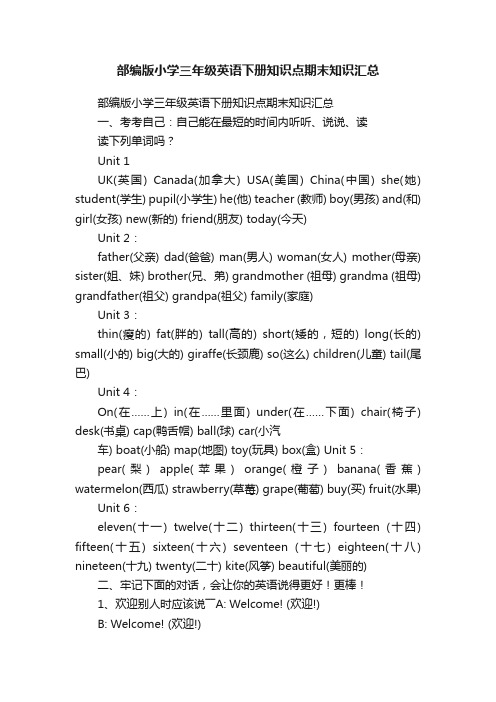
部编版小学三年级英语下册知识点期末知识汇总部编版小学三年级英语下册知识点期末知识汇总一、考考自己:自己能在最短的时间内听听、说说、读读下列单词吗?Unit 1UK(英国) Canada(加拿大) USA(美国) China(中国) she(她) student(学生) pupil(小学生) he(他) teacher (教师) boy(男孩) and(和) girl(女孩) new(新的) friend(朋友) today(今天)Unit 2:father(父亲) dad(爸爸) man(男人) woman(女人) mother(母亲) sister(姐、妹) brother(兄、弟) grandmother (祖母) grandma (祖母) grandfather(祖父) grandpa(祖父) family(家庭)Unit 3:thin(瘦的) fat(胖的) tall(高的) short(矮的,短的) long(长的) small(小的) big(大的) giraffe(长颈鹿) so(这么) children(儿童) tail(尾巴)Unit 4:On(在……上) in(在……里面) under(在……下面) chair(椅子) desk(书桌) cap(鸭舌帽) ball(球) car(小汽车) boat(小船) map(地图) toy(玩具) box(盒) Unit 5:pear(梨) apple(苹果) orange(橙子) banana(香蕉) watermelon(西瓜) strawberry(草莓) grape(葡萄) buy(买) fruit(水果) Unit 6:eleven(十一) twelve(十二) thirteen(十三) fourteen (十四) fifteen(十五) sixteen(十六) seventeen (十七) eighteen(十八) nineteen(十九) twenty(二十) kite(风筝) beautiful(美丽的)二、牢记下面的对话,会让你的英语说得更好!更棒!1、欢迎别人时应该说――A: Welcome! (欢迎!)B: Welcome! (欢迎!)2、问别人介绍朋友的名字应该说-――A:This is Amy. 这是艾米。
三年级下英语知识点归纳讲解
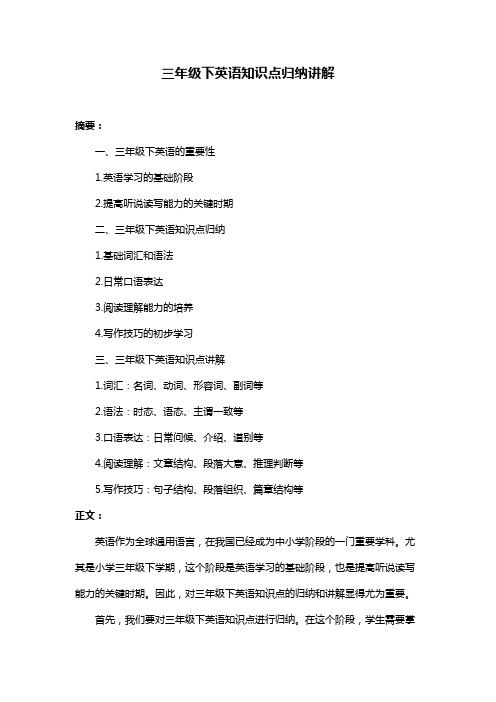
三年级下英语知识点归纳讲解摘要:一、三年级下英语的重要性1.英语学习的基础阶段2.提高听说读写能力的关键时期二、三年级下英语知识点归纳1.基础词汇和语法2.日常口语表达3.阅读理解能力的培养4.写作技巧的初步学习三、三年级下英语知识点讲解1.词汇:名词、动词、形容词、副词等2.语法:时态、语态、主谓一致等3.口语表达:日常问候、介绍、道别等4.阅读理解:文章结构、段落大意、推理判断等5.写作技巧:句子结构、段落组织、篇章结构等正文:英语作为全球通用语言,在我国已经成为中小学阶段的一门重要学科。
尤其是小学三年级下学期,这个阶段是英语学习的基础阶段,也是提高听说读写能力的关键时期。
因此,对三年级下英语知识点的归纳和讲解显得尤为重要。
首先,我们要对三年级下英语知识点进行归纳。
在这个阶段,学生需要掌握的基础词汇和语法知识是英语学习的基础。
此外,日常口语表达、阅读理解能力的培养以及写作技巧的初步学习也是非常重要的知识点。
接下来,我们针对三年级下英语知识点进行讲解。
词汇方面,学生需要掌握名词、动词、形容词、副词等基本词性的用法。
在语法方面,要学习时态、语态、主谓一致等语法规则。
此外,日常口语表达包括日常问候、介绍、道别等,这些都是日常生活中常用的表达。
在阅读理解方面,学生要学会分析文章结构、段落大意、推理判断等技巧。
写作技巧方面,学生需要学会组织句子结构、段落以及篇章结构,从而完成一篇内容完整、表达清晰的文章。
总之,三年级下英语是英语学习的基础阶段,学生需要掌握一定的基础词汇和语法知识,同时培养听说读写能力。
- 1、下载文档前请自行甄别文档内容的完整性,平台不提供额外的编辑、内容补充、找答案等附加服务。
- 2、"仅部分预览"的文档,不可在线预览部分如存在完整性等问题,可反馈申请退款(可完整预览的文档不适用该条件!)。
- 3、如文档侵犯您的权益,请联系客服反馈,我们会尽快为您处理(人工客服工作时间:9:00-18:30)。
部编版小学三年级英语下册知识点期末知识汇总一、考考自己:自己能在最短的时间内听听、说说、读读下列单词吗?Unit 1UK(英国) Canada(加拿大) USA(美国) China(中国) she(她) student(学生) pupil(小学生) he(他) teacher (教师) boy(男孩) and(和) girl(女孩) new(新的) friend(朋友) today(今天)Unit 2:father(父亲) dad(爸爸) man(男人) woman(女人) mother(母亲) sister(姐、妹) brother(兄、弟) grandmother (祖母) grandma (祖母) grandfather(祖父) grandpa(祖父) family(家庭)Unit 3:thin(瘦的) fat(胖的) tall(高的) short(矮的,短的) long(长的) small(小的) big(大的) giraffe(长颈鹿) so(这么) children(儿童) tail(尾巴)Unit 4:On(在……上) in(在……里面) under(在……下面) chair(椅子) desk(书桌) cap(鸭舌帽) ball(球) car(小汽车) boat(小船) map(地图) toy(玩具) box(盒)Unit 5:pear(梨) apple(苹果) orange(橙子) banana(香蕉) watermelon(西瓜) strawberry(草莓) grape(葡萄) buy(买) fruit(水果)Unit 6:eleven(十一) twelve(十二) thirteen(十三) fourteen (十四) fifteen(十五)sixteen(十六) seventeen (十七) eighteen(十八) nineteen(十九) twenty(二十) kite(风筝) beautiful(美丽的)二、牢记下面的对话,会让你的英语说得更好!更棒!1、欢迎别人时应该说――A: Welcome! (欢迎!)B: Welcome! (欢迎!)2、问别人介绍朋友的名字应该说-――A:This is Amy. 这是艾米。
3、向别人问来自哪儿应该说――A: Where are you from?(你来自哪儿?)B: I’m from the UK.(我来自英国。
)4、跟新朋友第一次见面――A: Nice to meet you!见到你很高兴。
B: Nice to meet you,too! 见到你也很高兴!A: Nice to see you again.很高兴再次见到你。
B: Nice to see you,too. 见到你我也很高兴。
6、看见久未见面的朋友或者别人身体不舒服,你该这么打招呼——A: How are you ? 你好吗?B: Fine,thank you我很好,谢谢你。
7、A: Let’s play a game. 让我们玩个游戏吧!B: OK! 好的!8、Let’s play teacher and student. 我们玩扮演老师和学生的游戏吧!9、Can you read this? 你会读这个吗?10、A: Who’s that woman? 那位女士是谁呀?B: She’s my mother.她是我的妈妈。
11、询问所看到的那个人是不是朋友的某位亲人,应该说:——A: Is she your mother? 她是你的妈妈吗?——B: Yes,she is./ No,she isn’t. 是的,她是。
/不,她不是。
12、别人想知道你的照片上是谁,他该这么说A: Who’s that boy? 那个男孩是谁?B: Guess! 你猜!13、A: Look at me! 看我!B: Ah! So cute! 啊!这么可爱啊!14、A: Look at the/ that monkey/giraffe/elephant.看这只/那只猴子/长颈鹿/大象。
B: It’s so fat/tall/big. 它好胖/高/大啊!15、Come here,children! 到这里来,孩子们!16、It has a long nose/short tail. 它有长鼻子/短尾巴。
17、It has a small eyes and big ears. 它有小眼睛和大耳朵。
18、It has a small head and a short tail.它有小脑袋和短尾巴。
19、A:How many animals do you know? 你认识多少动物?B: I know all the animals! 我认识所有的动物。
20、A: Where is my car/map/pencil box/cap?我的小汽车/地图/文具盒/帽子在哪儿?B: Is it in /on/under the desk? 它在桌子里/上/下面。
A: Yes,it is./No,it isn’t. 是的,它在。
/不,它没在。
21、Have a good time! 玩开心点!22、A: Let’s play hide and seek.我们一起玩捉迷藏吧!B: Great!好啊!23、A: Are you ready?你准备好了吗?B: Yes! 是的。
24、An apple a day keeps the doctor away!一天一苹果,医生远离我!25、A: Do you like pear/watermelon/orange.你喜欢梨/西瓜/橙子吗?B: Yes,I do./No,I don’t. 是的,我喜欢。
/不,我不喜欢。
C:I like banana/apple/grape.我喜欢香蕉/苹果/葡萄。
26、请别人吃东西,你该这么说――A: Have some grapes. 吃一些葡萄吧。
——B: Thank you./Sorry,I don’t like grapes.谢谢你。
/对不起,我不喜欢吃葡萄。
27、A: What do you like? 你喜欢什么?B: I like egg. 我喜欢鸡蛋。
28、你想吃点东西,你该说――A: Can I have some banana/strawberries?我能吃些香蕉/草莓吗?——B: Sure ,here you are. 当然可以,给你。
29、A: Thank you. 谢谢你。
B: You're welcome. 别客气。
30、A:Doggy bag please!请打包。
B: No way. 不可以!31、A: How many crayons/balloons do you have?你有多少只蜡笔/气球?B: I have 16. 我有十六只/个。
32、A: How many birds/cat do you see? 你看见多少只鸟/猫?B: I see 11. 我看见十一只。
33、A: So many apples! Let’s have a race.好多苹果啊!我们比赛摘苹果吧!B: Good idea. 好主意。
三、读读,记记下面的句子。
你会更棒的!Unit 1:What about you? 你呢?Wait a minute! 等一下Unit 2 :A: How beautiful! 好漂亮啊!B: Thank you. 谢谢!Unit 3 :Big,big,big! Make your eyes big. 大大大,把你的眼睛变大。
Small,small,small! Make your eyes small. 小小小,把你的眼睛变小。
Long,long,long! Make your arms long. 长长长,把你的手臂变长。
Short,short,short! Make your arms short. 短短短,把你的手臂变短。
Unit4:Put your foot under your chair.把你的脚放在椅子下面。
Put your hand on your chair. 把你的手放在椅子上。
Put your arm in your desk. 把你的胳膊放在书桌里。
Put your hand under your desk. 把你的手放在书桌下。
Silly me! 我真傻!Unit5:I’m full. 我饱了。
Me,neither. 我也不喜欢。
Unit6:The black one is a bird! 黑色的那个是只鸟!Open it and see! 打开看看。
四、读读下列单词,区别他们的意思。
China fatherbrotherfatcapCanadafamily brown catcartail map ball friend purpletall cap boatfruit pupiltwenty kitegrapeeleventwelve cat greateight五、读读下列句子,区别他们的意思。
How many apples do you see?How many apples do you have?Can I have some apples?Have some apples!。
